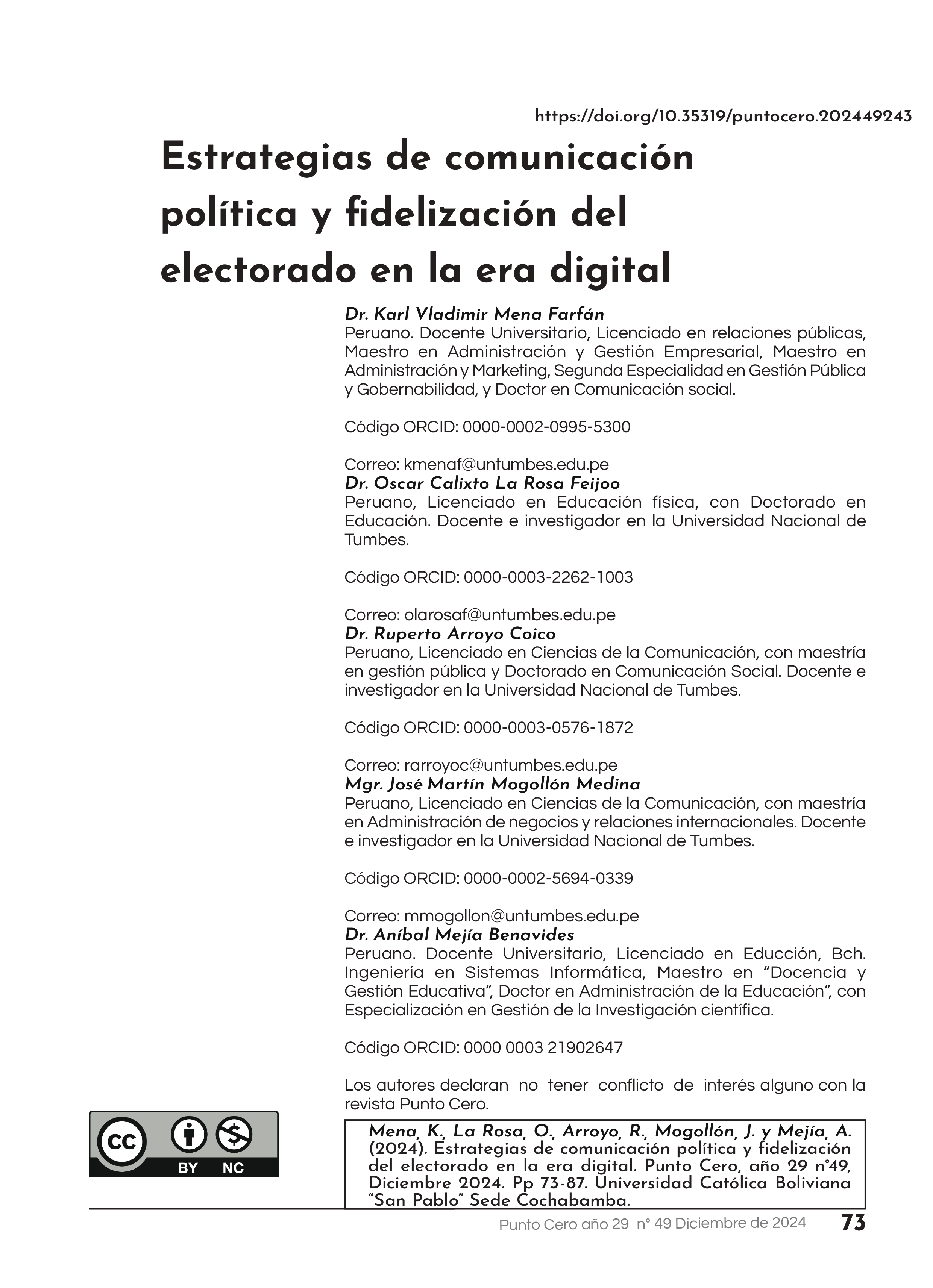Political Communication Strategies and Voter Loyalty in the Digital Age
DOI:
https://doi.org/10.35319/puntocero.202449243Keywords:
Political communication, Electoral campaigns, Political propaganda, Market research, Political message, Voter loyalty , Digital eraAbstract
This study focuses on Political Communication Strategies and Electorate Loyalty in the Context of the Digital Era. Through the observational method, it was discovered that effective political communication and the construction of strategic political messages are essential to cultivate the loyalty of the electorate, encouraging them to support a specific candidate in the electoral process. Mena (2020) is the researcher responsible for this analysis, whose interest in the topic led to the development of this research with the main purpose of knowing if the candidates handle the political message efficiently. The objective is to optimize the use of political communication to ensure the loyalty and continued support of voters towards a given candidate, adapting to the new dynamics and tools available in the digital age. This article examines the contemporary dynamics of political communication, electoral campaigns, political propaganda, market research, the creation of political messages, the identification of the target audience and voter loyalty in the context of the digital age. Through an exhaustive analysis, we seek to understand how these strategies influence the perception and behavior of the electorate, emphasizing the role of social networks and digital platforms in the transformation of political practice.
References
Arias, M., & Giraldo, C. (2016). El rigor científico en la investigación cualitativa. Investigación y Educación en Enfermería, 29(3), 500-514. https://www.redalyc.org/pdf/1052/105222406020.pdf
Bernal, C. (2018). Metodología de la investigación (tercera edición). Colombia: Pearson Education.
Bimber, B. (2014). Digital Media in Political Campaigns. Annual Review of Political Science, 17, 9-22.
Buenaño, T. (2017). Análisis comparativo de la propaganda política de los candidatos al congreso Ángel Javier Velásquez Quesquén y Virgilio Acuña Peralta durante los comicios electorales 2016. Tesis de Licenciatura: https://repositorio.uss.edu.pe/handle/20.500.12802/5156
Carranza, S. (2017). Estrategia de comunicación política del candidato a alcalde del partido líder para el municipio de Guatemala. Universidad de San Carlos de Guatemala: http://biblioteca.usac.edu.gt/tesis/16/16_1547.pdf
Cervi, L., & Roca, N. (2017). La modernización de la campaña electoral para las elecciones generales de España en 2015. ¿Hacia la americanización? Comunicación y Hombre, 133-150. https://www.redalyc.org/pdf/1294/129449617007.pdf DOI: https://doi.org/10.32466/eufv-cyh.2017.13.219.133-150
Echeverría, M., & Meyer, J. (2017). El Estado contra la deliberación El modelo de comunicación política en la reforma electoral 2014. Argumentos, 30(85), 197-214. https://www.redalyc.org/pdf/595/59555067001.pdf
Encinas, D., & Aragón, J. (2016). Perfil Electoral Peruano 2016. https://www.researchgate.net/publication/311948438_Perfil_Electoral_Peruano_2016
Enli, G. (2017). Trust and Credibility in the Age of Social Media. Politics and Communication, 33(3), 345-353.
Hernández , R. (2017). Metodología de la Investigación (Sexta ed.). Hall Prentice.
Hernandez , J., & Echeverri , L. (2018). Democracia electoral en Colombia desde una visión de competencia. El Ágora, 18(2), 496-511. https://doi.org/ http://dx.doi.org/10.21500/16578031.3829 DOI: https://doi.org/10.21500/16578031.3829
Hernández, R., Fernández, C., & Baptista, y. M. (2014). Metodología de la investigación científica (6ta edición). McGraw Hill.
Holtz-Bacha, C. (2017). Political Advertising in the 2014 European Parliament Elections. Palgrave Macmillan. DOI: https://doi.org/10.1057/978-1-137-56981-3
Jamieson, K., & Kenski, K. (2017). Political Communication: Then, Now, and Beyond. https://www.researchgate.net/publication/321170652_Political_Communication_Then_Now_and_Beyond
Kreiss, D. (2016). Prototype Politics: Technology-Intensive Campaigning and the Data of Democracy. Oxford University Press. DOI: https://doi.org/10.1093/acprof:oso/9780199350247.001.0001
López , C., & Ortegón, L. (2017). Del marketing político a las comunidades de marca. Un estudio comparativo de partidos políticos en Bogotá D.C. Universidad & Empresa, 19(32), 9-35. https://doi.org/10.12804/http://revistas.urosario.edu.co/index.php/empresa/article/view/4552 DOI: https://doi.org/10.12804/http://revistas.urosario.edu.co/index.php/empresa/article/view/4552
Mena, K., & Apolaya , J. (2022). Estrategias de comunicación política para consolidar la fidelización del elector. Revista Multidisciplinar, 6(3). https://www.semanticscholar.org/paper/Estrategias-de-comunicaci%C3%B3n-pol%C3%ADtica-para-la-del-Farf%C3%A1n-Sotelo/c53a28618a90c00497542cb51bf2736bc07d5187
Mena, F.K. (2022).” Fortalecimiento de la democracia en los procesos electorales en Lambayeque del Perú: Plan de comunicación política para la fidelización del elector” [tesis de posgrado, Universidad César Vallejo]. https://hdl.handle.net/20.500.12692/101276 DOI: https://doi.org/10.37811/cli_w602
Muñiz, C. (2019). Estudios de comunicación política desde una visión múltiple. Perspectivas de la comunicación, 12(2), 7-10. https://doi.org/http://dx.doi.org/10.4067/S0718-48672019000200007 DOI: https://doi.org/10.4067/S0718-48672019000200007
Muñoz, P. (2021). La democracia peruana en busca de representación. Carnegie.
Nielsen, R. K., & Vaccari, C. (2013). Do Social Media Win Elections? The Impact of Twitter and Facebook. Journal of Political Marketing, 12(4), 313-339.
Özbek, V., & Mergener, U. (2019). Factors affecting voter loyalty: a research on university students. Business & Management Studies: An International Journal, 7(5), 1967-1988. https://asosindex.com.tr/index.jsp?modul=articles-page&journal-id=1817&article-id=306555 DOI: https://doi.org/10.15295/bmij.v7i5.1280
Percastre, S., & Dorantes, G. (2016). Comunicación política electoral en la era digital: la campaña electoral de 2015 en la Ciudad de México. Revista de Comunicación Vivat Academia(137), 36-56. https://doi.org/10.15178/va.2016.137.36-56 DOI: https://doi.org/10.15178/va.2016.137.36-56
Quintero, J. (2015). La ética en la investigación. Belloso Chasín.
Ríspolo, F. (2020). El Campo De La Comunicación Política: El Lugar de la comunicación de gobierno. Postdata, 25(1), 99-135. http://www.scielo.org.ar/pdf/postdata/v25n1/1851-9601-postdata-25-01-41.pdf
Smith, A., & Rainie, L. (2010). The Internet and Campaign 2010. Pew Internet & American Life Project.
Vargas , Z. (2009). La Investigación aplicada: una forma de conocer las realidades con evidencia científica. 33(1), 155-165. https://www.redalyc.org/pdf/440/44015082010.pdf DOI: https://doi.org/10.15517/revedu.v33i1.538
Verastegui (2021), en su tesis titulada “Desarrollo histórico de los procesos electorales en el Perú: guía de comunicación política para su evaluación, del 2000 al 2021”, tesis de Doctoral, Universidad César vallejo. https://hdl.handle.net/20.500.12692/133302
Wolken, S. (2020). National Media Systems, Affective Polarization, and Loyalty in Vote Choice: Contextualizing the Relationship Between News Media and Partisanship. Tesis Programa de Posgrado en Comunicación. https://etd.ohiolink.edu/acprod/odb_etd/ws/send_file/send?accession=osu1586952294107063&disposition=inline

Downloads
Published
How to Cite
Issue
Section
License
Copyright (c) 2024 Revista Punto Cero

This work is licensed under a Creative Commons Attribution-NonCommercial 4.0 International License.








